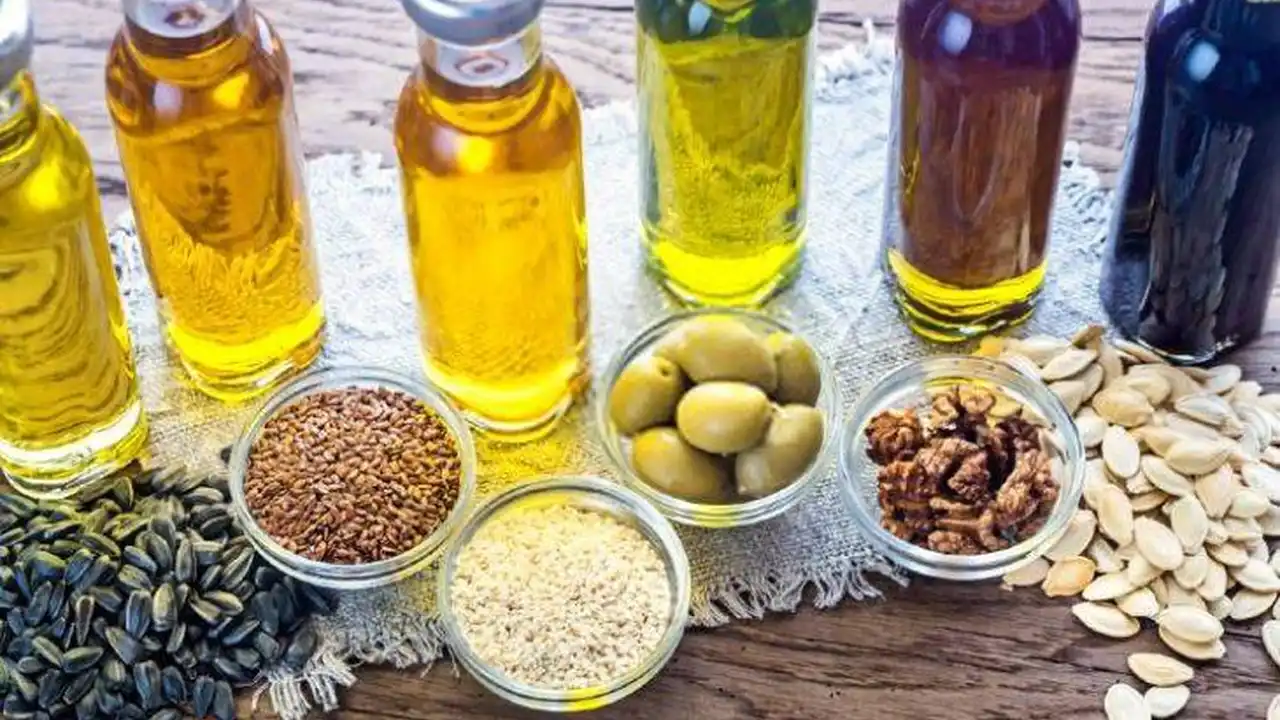The Best and Worst Cooking Oils for Your Health
Sample meta description.

Okay, let's talk cooking oils. You see them lined up in the grocery store, a dizzying array of choices. Olive oil, coconut oil, avocado oil, sunflower oil... it can feel overwhelming. But choosing the right cooking oil is crucial for your health. Some oils are packed with healthy fats and antioxidants, while others are loaded with saturated and trans fats that can wreak havoc on your cholesterol levels and overall well-being. So, let’s break it down and figure out which oils are your friends and which ones you should probably avoid.
Understanding Fats: Saturated, Unsaturated, and the Dreaded Trans Fats
First things first, a quick refresher on fats. We’ve got saturated fats, unsaturated fats (monounsaturated and polyunsaturated), and then there are the villains: trans fats. Saturated fats, found in things like butter and coconut oil, have gotten a bad rap for years. While it's true that too much saturated fat can raise your LDL (bad) cholesterol, the story is more nuanced than that. Unsaturated fats, especially monounsaturated fats like those in olive oil and avocado oil, are generally considered heart-healthy. Polyunsaturated fats, like those in sunflower and flaxseed oil, are also beneficial. And then there are trans fats, often found in processed foods, which are best avoided altogether. They raise your LDL cholesterol and lower your HDL (good) cholesterol – a double whammy!
The Good Guys: Healthy Cooking Oils for a Healthier You
Extra Virgin Olive Oil (EVOO): The Mediterranean Diet Staple and Heart-Healthy Champion
Extra virgin olive oil is a star player. It's rich in monounsaturated fats and antioxidants, making it a fantastic choice for everyday cooking. EVOO is great for drizzling over salads, sautéing vegetables, and even baking (at lower temperatures). The flavor is fantastic, adding a distinct Mediterranean vibe to your dishes. Look for EVOO that’s cold-pressed and stored in a dark glass bottle to protect it from light and oxidation.
Product Recommendation: California Olive Ranch Everyday Extra Virgin Olive Oil. This is a readily available, affordable option that offers good quality and flavor. A 16.9 oz bottle typically costs around $10-15. It's perfect for everyday use, from salad dressings to light sautéing.
Using EVOO: Don’t crank the heat too high with EVOO. It has a lower smoke point than some other oils, meaning it can start to break down and release harmful compounds at high temperatures. Stick to low and medium heat for best results.
Avocado Oil: High Heat Hero with a Neutral Flavor Profile
Avocado oil is another excellent choice, especially if you need a cooking oil with a high smoke point. This means you can use it for searing, frying, and grilling without worrying about it breaking down. Avocado oil also has a neutral flavor, so it won't overpower the taste of your food.
Product Recommendation: Chosen Foods 100% Pure Avocado Oil. This brand is widely available and offers a high-quality avocado oil that's perfect for high-heat cooking. A 1-liter bottle typically costs around $15-20.
Using Avocado Oil: Avocado oil is incredibly versatile. Use it for stir-fries, roasting vegetables, or even baking. Its neutral flavor makes it a great all-purpose oil.
Coconut Oil: A Tropical Treat (in Moderation) with a Unique Flavor
Coconut oil has been a hot topic for years. It’s high in saturated fat, but some studies suggest that the type of saturated fat in coconut oil (medium-chain triglycerides or MCTs) may not be as harmful as other types. However, it's still best to use coconut oil in moderation. It has a distinct coconut flavor that can be delicious in certain dishes, like curries and baked goods.
Product Recommendation: Nutiva Organic Coconut Oil. This brand offers a high-quality, unrefined coconut oil that retains its natural flavor. A 14 oz jar typically costs around $8-12.
Using Coconut Oil: Coconut oil is solid at room temperature, so you'll need to melt it before using it. It's great for vegan baking, adding a creamy texture and subtle coconut flavor. It's also fantastic for stir-fries and curries.
Walnut Oil: Nutty Flavor for Salad Dressings and Finishing Touches
Walnut oil is best used for finishing dishes and in salad dressings. It has a rich, nutty flavor that adds a delicious depth. It's not suitable for high-heat cooking, as it has a low smoke point.
Product Recommendation: La Tourangelle Roasted Walnut Oil. This oil has a beautiful roasted walnut flavor and is perfect for drizzling over salads or roasted vegetables. A 8.45 oz bottle typically costs around $10-15.
Using Walnut Oil: Drizzle walnut oil over salads, roasted vegetables, or grilled fish. It's also a great addition to homemade pesto.
The Ones to Watch Out For: Cooking Oils to Use Sparingly or Avoid Altogether
Vegetable Oil: A Generic Choice That's Often Highly Processed
Vegetable oil is often a blend of different oils, such as soybean, corn, and sunflower oil. It's typically highly processed and may contain unhealthy trans fats. While it's inexpensive, it's not the best choice for your health.
Canola Oil: Another Processed Option with Potential Concerns
Canola oil is another commonly used oil, but it's also highly processed and may contain trace amounts of trans fats. While some argue it's a healthy option, there are better choices available.
Hydrogenated Oils: The Trans Fat Traps
Avoid any oils that are labeled as "hydrogenated" or "partially hydrogenated." These oils are packed with unhealthy trans fats that can significantly increase your risk of heart disease.
Smoke Point Showdown: Choosing the Right Oil for the Right Temperature
The smoke point of an oil is the temperature at which it starts to break down and release harmful compounds. Using an oil beyond its smoke point can not only affect the flavor of your food but also create potentially harmful toxins. Here's a quick guide to smoke points:
- Extra Virgin Olive Oil: 375°F (190°C)
- Avocado Oil: 520°F (271°C)
- Coconut Oil: 350°F (177°C)
- Walnut Oil: 320°F (160°C)
- Vegetable Oil: 400-450°F (204-232°C) (varies depending on the blend)
- Canola Oil: 400°F (204°C)
Always choose an oil with a smoke point that's higher than the temperature you'll be cooking at.
Price Point: Finding Healthy Oils That Fit Your Budget
Healthy cooking oils can be more expensive than processed options, but it's an investment in your health. Here's a general idea of price ranges:
- Extra Virgin Olive Oil: $10-20 per bottle
- Avocado Oil: $15-25 per bottle
- Coconut Oil: $8-15 per jar
- Walnut Oil: $10-20 per bottle
- Vegetable Oil: $3-5 per bottle
- Canola Oil: $5-8 per bottle
Look for sales and consider buying in bulk to save money. Also, remember that you don't need to use a lot of oil to get the benefits. A little goes a long way!
Storage Secrets: Keeping Your Oils Fresh and Flavorful
Proper storage is crucial for maintaining the quality and flavor of your cooking oils. Store your oils in a cool, dark place, away from heat and light. Light and heat can cause oils to oxidize and become rancid. Use dark glass bottles to help protect the oil from light. Once opened, use your oils within a few months for the best flavor and quality.
Beyond the Bottle: Incorporating Healthy Fats into Your Diet
Remember, cooking oils are just one piece of the puzzle. Focus on incorporating healthy fats from other sources as well, such as avocados, nuts, seeds, and fatty fish. A balanced diet with plenty of fruits, vegetables, and whole grains is the key to overall health and well-being. So, get cooking, experiment with different oils, and enjoy the delicious and healthy benefits!
:max_bytes(150000):strip_icc()/277019-baked-pork-chops-with-cream-of-mushroom-soup-DDMFS-beauty-4x3-BG-7505-5762b731cf30447d9cbbbbbf387beafa.jpg)






